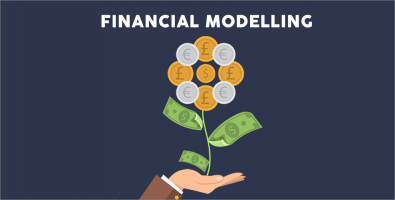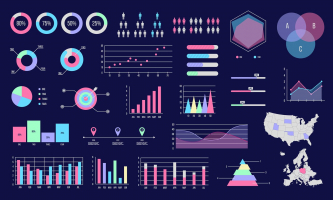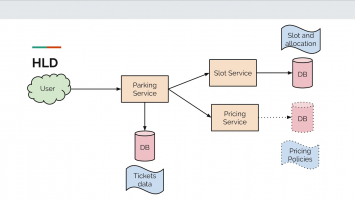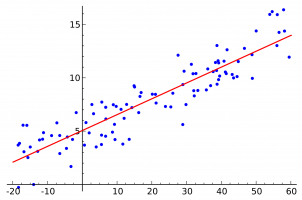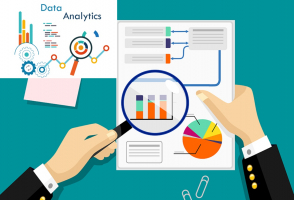Top 10 Best Online Probability & Statistics Courses
Probability and Statistics have always been very important concepts in math, but they also have an important role in the Data Science world and play an ... read more...important role in Big Data analysis. In this rapidly evolving Big Data and Data Science world, it is very important to know about the functions of Probability and related Statistics. This is the top 10 best online probability & statistics courses.
-
Bayesian Statistics Certification Course Part 2 : Techniques and Models ranks first in the list of best online probability & statistics courses. This is the second course in a two-part series that introduces the fundamentals of Bayesian statistics. It is a continuation of the course Bayesian Statistics: From Concept to Data Analysis, which introduces Bayesian methods through the use of simple conjugate models. Real-world data frequently necessitates more sophisticated models in order to reach realistic conclusions. This course seeks to broaden "Bayesian toolbox" by introducing more general models and computational techniques for fitting them. They focus on Markov chain Monte Carlo (MCMC) methods, which enable sampling from posterior distributions with no analytical solution. They use the open-source, freely available software R (some experience is assumed, such as having completed the previous R course) and JAGS (no experience required).
You'll learn how to build, fit, evaluate, and compare Bayesian statistical models to answer scientific questions using continuous, binary, and count data. To create an active learning experience, this course combines lecture videos, computer demonstrations, readings, exercises, and discussion boards. The lectures cover some of the fundamental mathematical concepts, as well as explanations of the statistical modeling process and a few basic modeling techniques used by statisticians. Computer demonstrations provide concrete, hands-on instructions. After completing this course, you will have access to a wide range of Bayesian analytical tools that are customizable to your data.
Skills you will gain:
- Gibbs Sampling, Bayesian Statistics, Bayesian Inference, R Programming
It is sub divided in the following format:
- Statistical modeling and Monte Carlo estimation
- Markov chain Monte Carlo (MCMC)
- Common statistical models
- Count data and hierarchical modeling
- Capstone Project
Rating: 4.8/5.0
Enroll here: coursera.org/learn/mcmc-bayesian-statistics
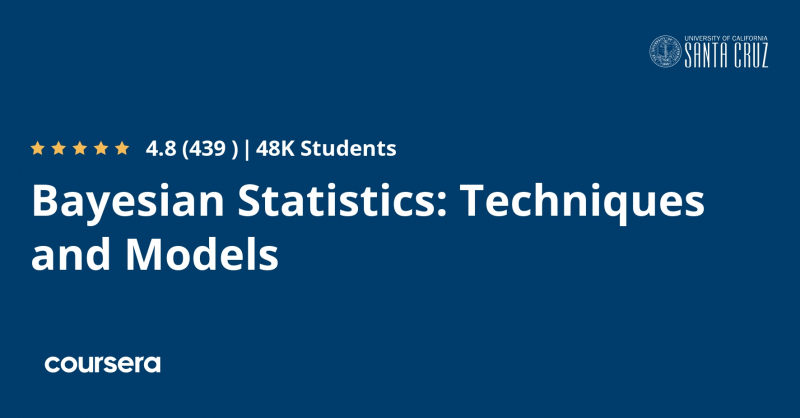
coursera.org -
SPSS Statistics Essential Training [LinkedIn Learning] ranks 2nd in the list of best online probability & statistics courses. SPSS Statistics is a data analysis and statistics program designed for businesses, governments, research institutes, and academic institutions. In this course, Barton Poulson teaches SPSS Statistics in a practical, visual, and non-mathematical manner, demonstrating how to use the popular program to analyze data in ways that are difficult or impossible in spreadsheets but do not require you to master programming languages like Python or R.
Barton covers everything from importing spreadsheets to creating data visualizations to calculating descriptive statistics, with an emphasis on clarity, interpretation, communicability, and application. This course is ideal for beginning researchers and those who want to use data more effectively in their professional and academic work. Because of its non-mathematical approach, it may not be suitable if you’d like to learn advanced statistical concepts and calculations. However, it simplifies all the statistical work involved in learning SPSS and descriptive statistics.
Some course highlights include:
- A non-mathematical approach to SPSS where you don’t have to learn programming languages for data science. This is therefore the best statistics course on LinkedIn Learning if you don’t have a coding or math background.
- Learning data visualization techniques, and how to share descriptive statistics with other members of your team so they can reap the same benefits.
- Important data wrangling methods, so you can better process raw data to make it clean and reliable before you feed it to SPSS.
Rating: 4.7/5.0
Enroll here: linkedin.com/learning/spss-statistics-essential-training-2
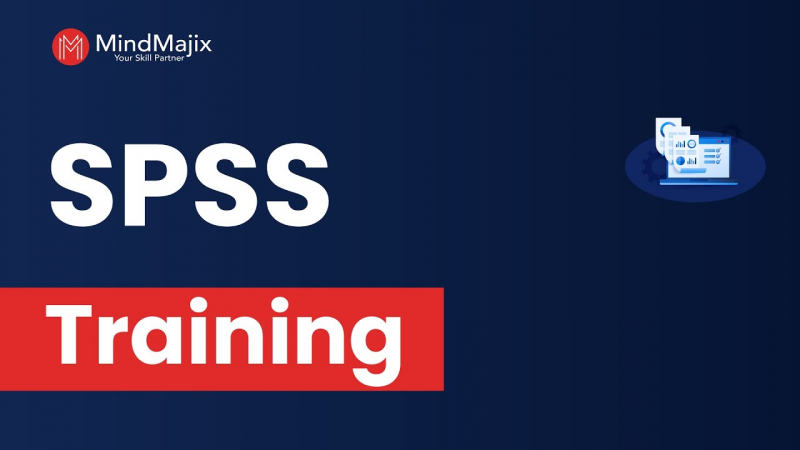
youtube.com 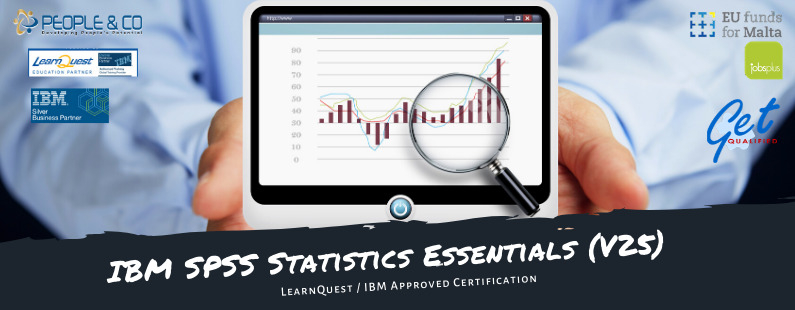
peoplelearning.com.mt -
Business Statistics Certification from Rice University (Coursera) ranks 3rd in the list of best online probability & statistics courses. The 5-course Business Statistics and Analysis Specialization is designed to equip you with a basic understanding of business data analysis tools and techniques. You will master essential spreadsheet functions, build descriptive business data measures, and develop your aptitude for data modeling. You will also explore basic probability concepts, including measuring and modeling uncertainty, and you will use various data distributions, along with the Linear Regression Model, to analyze and inform business decisions. The Specialization culminates with a Capstone Project in which you will apply the skills and knowledge you’ve gained to an actual business problem.
You'll also learn about basic probability concepts, such as measuring and modeling uncertainty, and how to analyze and inform business decisions using various data distributions and the Linear Regression Model. The Specialization concludes with a Capstone Project in which you will apply your newly acquired skills and knowledge to a real-world business problem.
Skills you will gain:
- Microsoft Excel, Linear Regression, Statistical Hypothesis Testing, Lookup Table, Data Analysis, Pivot Table, Statistics, Statistical Analysis, Normal Distribution, Poisson Distribution, Log–Log Plot, Interaction (Statistics)
The Courses in this Program are:
- Introduction to Data Analysis Using Excel
- Basic Data Descriptors, Statistical Distributions, and Application to Business Decisions
- Business Applications of Hypothesis Testing and Confidence Interval Estimation
- Linear Regression for Business Statistics
- Business Statistics and Analysis Capstone Project
Rating: 4.7/5.0
Enroll here: coursera.org/specializations/business-statistics-analysis
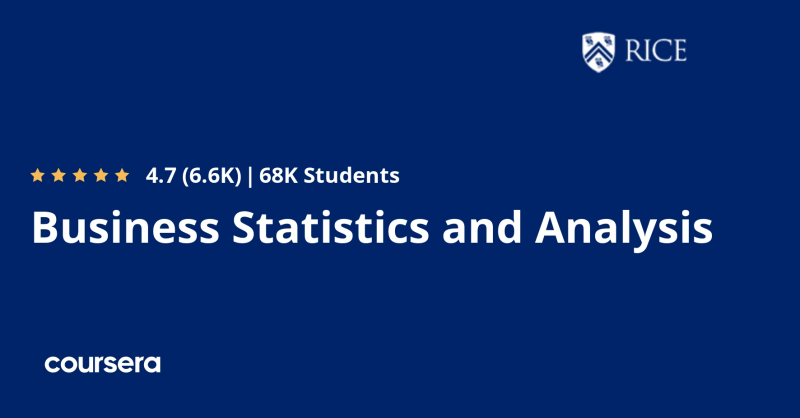
coursera.org -
Probability-The Science of Uncertainty and Data by MIT (edX) ranks 4th on the list of best online probability & statistics courses. Keeping a competitive advantage requires more than just good timing or a single solution. A well-designed and well-executed strategy is required for long-term advantage. This course was designed to provide you with the tools and frameworks you'll need to develop and implement a successful strategy.
You'll learn how to assess your own strategy and identify potential sources of competitive advantage from a perspective that includes the internal, external, and dynamic fit of your strategy. You'll also learn how to improve your ability to assess the strategic impact of your competitors' moves and how to maintain competitive advantage, as well as how to understand the general drivers that create and sustain competitive advantage and how to identify organizational change barriers.At a glance
- Institution: Wharton
- Subject: Business & Management
- Level: Intermediate
- Prerequisites:
- Familiarity with basic business concepts
- This is a graduate level course
- Language: English
- Video Transcript: English
- Associated programs:Professional Certificate in Strategic Management
Highlights:
- The course is suitable for advanced level students
- Students must be familiar with college-level calculus before opting for the program
- Learn about sets, sequences, and series
- Assignments and examinations help students test their knowledge
- Students will receive a certificate after completing the program
Duration: 16 weeks (10-14 hours per week)
Rating: 4.7/5.0
Enroll here: edx.org/course/business-strategy-from-wharton-competitive-advan-2
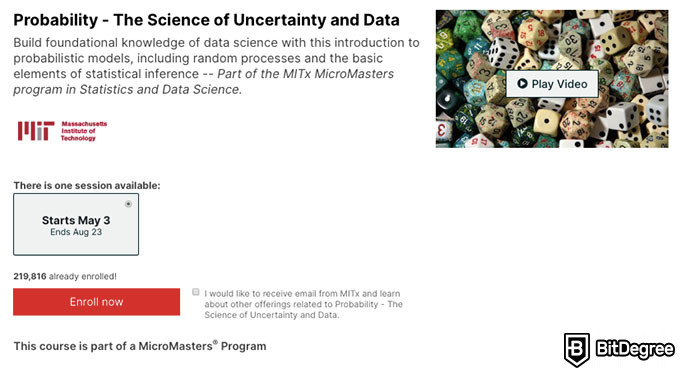
slideshare.net 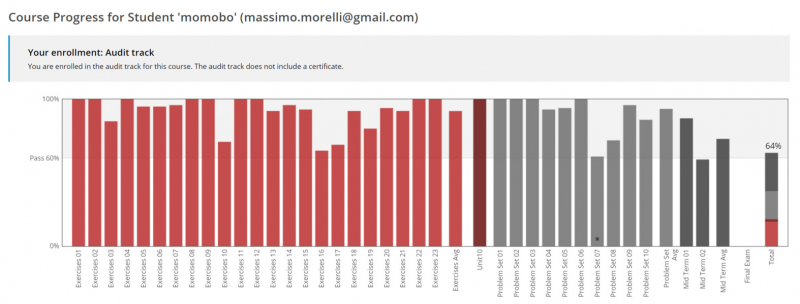
linkedin.com -
Statistics Certification with R from Duke University (Coursera) ranks 5th in the list of best online probability & statistics courses. In this Duke University program, you will deconstruct data in R, create analysis reports, and learn Bayesian statistical inference and modeling. You will also learn how to use R to communicate statistical results, critique data-driven claims, evaluate data-driven decisions, and visualize data. Mine etinkaya-Rundel, Associate Professor of Practice, David Banks, Professor of Practice, Colin Rundel, Assistant Professor of Practice, and Merlise A Clyde, Professor designed and taught the course. If you want to learn Probability and Statistics with R, this is an excellent option.
You will learn how to analyze and visualize data in R and create reproducible data analysis reports, demonstrate a conceptual understanding of the unified nature of statistical inference, perform frequentist and Bayesian statistical inference and modeling to understand natural phenomena and make data-based decisions, communicate statistical results correctly, effectively, and in context without relying on statistical jargon, and critique data-based claims in this Specialization.
What you will learn:
- Analyze and visualize data
- Perform hypothesis tests, interpret statistical results (e.g., p-values), and report the results of your analysis to clients
- Fit, examine, and utilize regression models to examine relationships between multiple variables
- Install and use R and RStudio
The 5 courses in this Specialization are:
- Introduction to Probability and Data
- Inferential Statistics
- Linear Regression and Modeling
- Bayesian Statistics
- Statistics with R Capstone Project
Rating: 4.7/5.0
Enroll here: coursera.org/specializations/statistics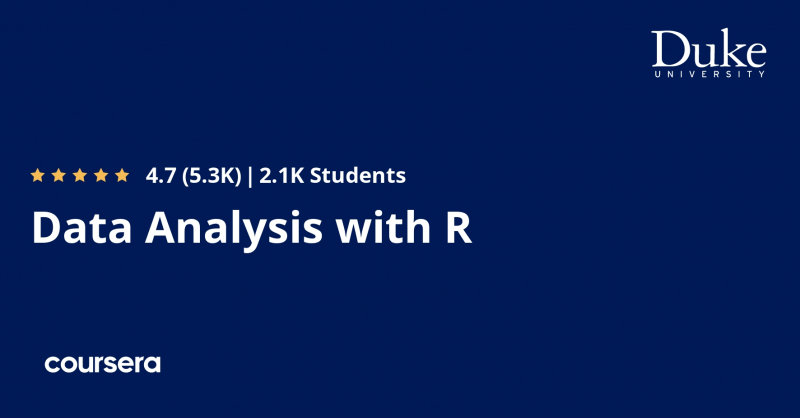
coursera.org 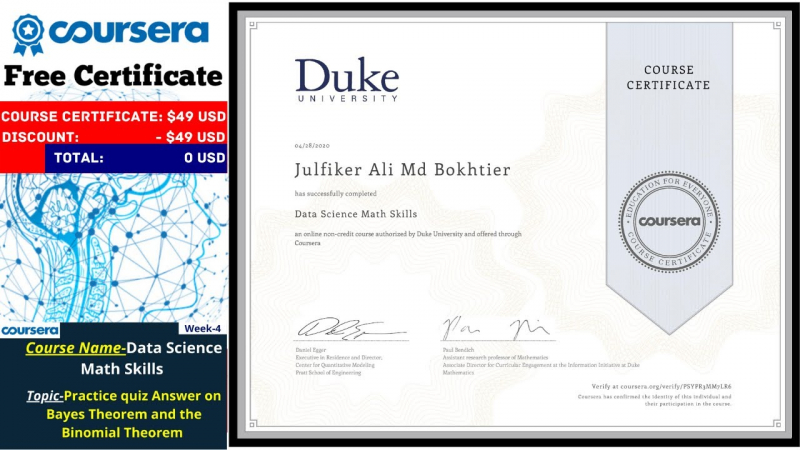
youtube.com -
Statistics and Data Science Micromaster Certification by MIT (edX) ranks 6th in the list of best online probability & statistics courses. This MicroMasters® program in Statistics and Data Science (SDS) was developed by MITx and the MIT Institute for Data, Systems, and Society (IDSS). It is a multidisciplinary approach comprised of four online courses and a virtually proctored exam that will provide you with the foundational knowledge essential to understanding the methods and tools used in data science, and hands-on training in data analysis and machine learning. You will dive into the fundamentals of probability and statistics, as well as learn, implement, and experiment with data analysis techniques and machine learning algorithms. This program will prepare you to become an informed and effective practitioner of data science who adds value to an organization.
This MicroMasters program, which consists of four online courses, will help you gain the foundational knowledge needed to understand the methods and tools used in data science and get hands-on experience with machine learning and data analysis. Begin with the fundamentals of probability and statistics before progressing to data analysis techniques and machine learning algorithms. To get the most out of this certification, you should be familiar with college-level calculus, mathematical reasoning, and Python programming. By the end of the program, you will be prepared to apply for a variety of data science positions.
What you will learn
- Master the foundations of data science, statistics, and machine learning
- Analyze big data and make data-driven predictions through probabilistic modeling and statistical inference; identify and deploy appropriate modeling and methodologies in order to extract meaningful information for decision making
- Develop and build machine learning algorithms to extract meaningful information from seemingly unstructured data; learn popular unsupervised learning methods, including clustering methodologies and supervised methods such as deep neural networks
- Finishing this MicroMasters program will prepare you for job titles such as: Data Scientist, Data Analyst, Business Intelligence Analyst, Systems Analyst, Data Engineer
Highlights:
- Strengthen your foundation of data science, statistics, and machine learning throughout the series of 5 courses.
- Instructors provide tips and advice on the best practices to develop and implement algorithms using the tools.
- Learn to analyze big data and make data-driven predictions through statistical inference and probabilistic modeling to extract meaningful data for decision making.
- Build machine learning algorithms to make sense of the unstructured data and gain relevant information.
- Work on popular unsupervised learning methods such as clustering methodologies and supervised methods such as deep neural networks.
- There are various job titles that can be applied to, after the completion of this certification such as data scientist, data analyst, system analyst to name a few.
Duration: 2 to 16 weeks per course, 10 to 14 hours per week, per course
Rating: 4.6/5.0
Enroll here: edx.org/micromasters/mitx-statistics-and-data-science
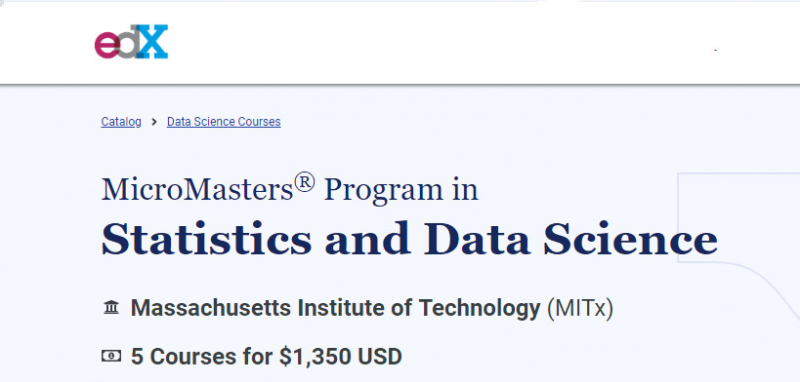
courses4you.com 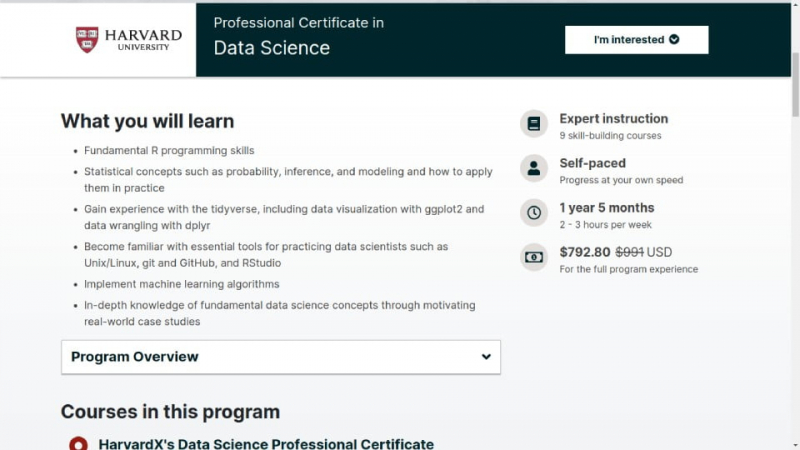
confused -
Bayesian Statistics Certification Course Part 1 : From Concept to Data Analysis ranks 7th in the list of best online probability & statistics courses. The Bayesian approach to statistics is introduced in this course, beginning with the concept of probability and progressing to data analysis. You will learn about the Bayesian approach's philosophy as well as how to apply it to common types of data. You will compare the Bayesian approach to the more commonly taught Frequentist approach and discuss some of its advantages. The Bayesian approach, in particular, allows for better accounting of uncertainty, results with more intuitive and interpretable meaning, and more explicit statements of assumptions. To create an active learning experience, this course combines lecture videos, computer demonstrations, readings, exercises, and discussion boards.
For computing, you have the choice of using Microsoft Excel or the open-source, freely available statistical package R, with equivalent content for both options. The lectures provide some of the basic mathematical development as well as explanations of philosophy and interpretation. Completion of this course will give you an understanding of the concepts of the Bayesian approach, understanding the key differences between Bayesian and Frequentist approaches, and the ability to do basic data analyses.
Skills you will gain:
- Statistics, Bayesian Statistics, Bayesian Inference, R Programming
Specifically you will learn about:
- Probability and Bayes’ Theorem
- Statistical Inference
- Priors and Models for Discrete Data
- Models for Continuous Data
Rating: 4.6/5.0
Enroll here: coursera.org/learn/bayesian-statistics
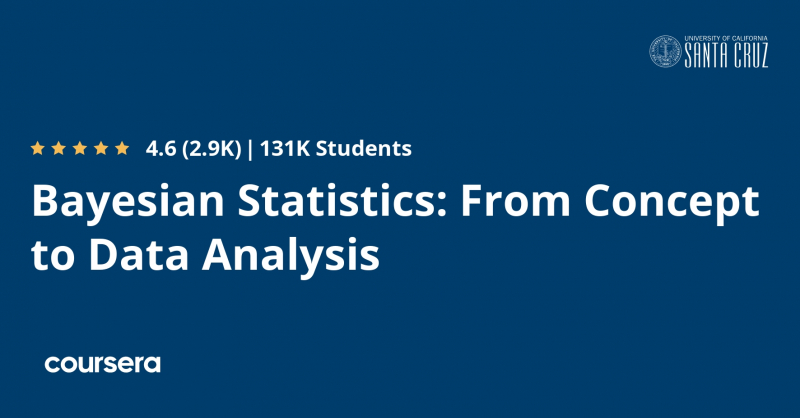
coursera.org -
This Specialization focuses on social science research methods, design, and statistical analysis. In the final Capstone Project, you'll put your knowledge to use by developing your own research question, collecting data, analyzing and reporting on the findings using statistical methods. This online statistics course will teach you how to identify and ask interesting questions, analyze data sets, and accurately interpret results in order to make sound evidence-based decisions.
The lessons will cover research methods, design, and statistical analysis for social science research questions. In addition, the final project allows you to apply what you've learned in class to create your own questions, collect data, analyze it, and report it using statistical methods. After completing the certification, you will be able to tackle more complex research questions and find answers to them.
Skill you will gain:
- Statistics
- Statistical Inference
- R Programming
- Qualitative Research
- Confidence Interval
- Statistical Hypothesis Testing
- Regression Analysis
- Analysis Of Variance (ANOVA)
Highlights:
- As this is a beginner-level program so no specific prerequisite is required for enrollment.
- Discover the principles of scientific methods in the behavioral and social sciences.
- Learn about data collection, description, analysis, and interpretation in qualitative research.
- Cover the concepts of statistics so that you can use them to find the solution to various issues.
- Gain practical experience and perform necessary tests using software introduced in the courses.
- Collaborate with your fellow learners for the capstone project and formulate a research hypothesis and perform the investigation and analysis.
- Complete all the graded assignments and assessments to earn the completion badge.
Rating: 4.5/5.0
Enroll here: coursera.org/specializations/jhu-data-science
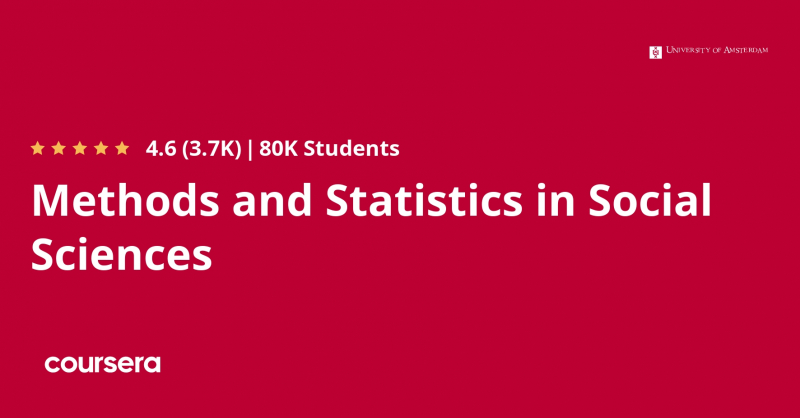
coursera.org 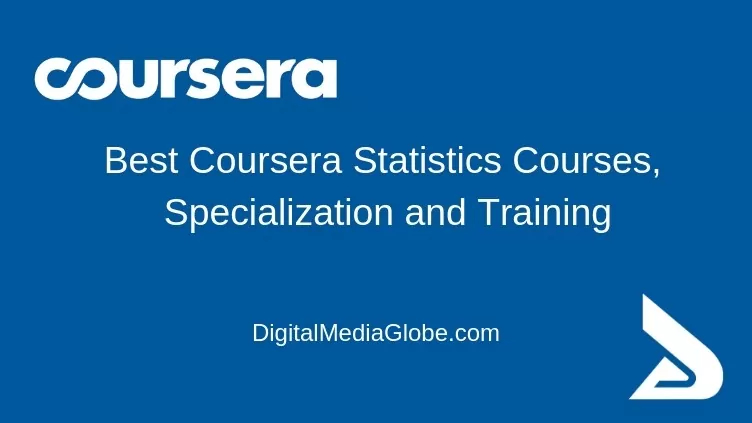
digitalmediaglobe.com -
This is a thorough course that covers every aspect of data science. This program's statistics component will teach you about statistical inference, or the process of drawing conclusions from data. It will cover all of the major inference theories (frequentists, Bayesian, and likelihood). Roger D. Peng, PhD Associate Professor of Biostatistics, Brian Caffo, PhD Professor of Biostatistics, and Jeff Leek, PhD Associate Professor of Biostatistics created and teach the program.
This Specialization covers the concepts and tools you'll need throughout the entire data science pipeline, from asking the right kinds of questions to making inferences and publishing results. In the final Capstone Project, you’ll apply the skills learned by building a data product using real-world data. At completion, students will have a portfolio demonstrating their mastery of the material.
Skills you will gain:
- Github, Machine Learning, R Programming, Regression Analysis, Data Science, Rstudio, Data Analysis, Debugging, Data, Manipulation, Regular Expression (REGEX), Data Cleansing, Cluster Analysis
The 10 courses that comprise this Data Science program are:
- The Data Scientist’s Toolbox
- R Programming
- Getting and Cleaning Data
- Exploratory Data Analysis
- Reproducible Research
- Statistical Inference
- Regression Models
- Practical Machine Learning
- Developing Data Products
- Data Science Capstone Project
Rating : 4.5/5.0
Enroll here: coursera.org/specializations/jhu-data-science
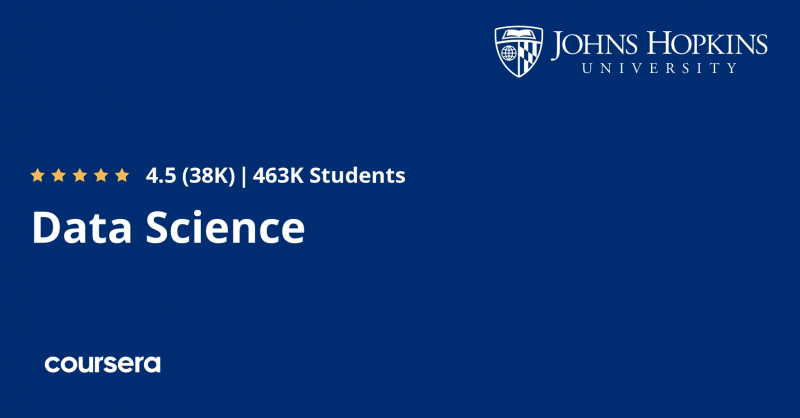
coursera.org 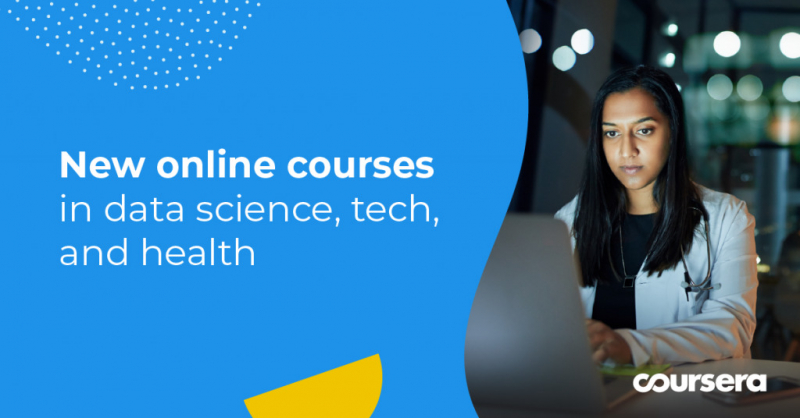
blog.coursera.org -
George Ingersoll is the UCLA Anderson School of Management's Associate Dean of Executive MBA Programs. He designed this workshop to teach you about probability, sampling, regression, and decision analysis. This statistics tutorial is ideal for beginners and those with intermediate knowledge. This workshop will teach you the fundamentals of statistics in order to give you a leg up at work or in school.
This workshop is designed to help you make sense of basic probability and statistics with easy-to-understand explanations of all the subject's most important concepts. Whether you are starting from scratch or if you are in a statistics class and struggling with your assigned textbook or lecture material, this workshop was built with you in mind. By the end of this workshop you should be able to pass any introductory statistics course. This workshop will teach you probability, sampling, regression, and decision analysis.
What you will learn:
- By the end of this workshop you should be able to pass any introductory statistics course
- This workshop will teach you probability, sampling, regression, and decision analysis
Specifically you will learn about:
- Joint and Conditional Probability
- Bayes’ Rule & Random Variables
- Probability Distributions
- The Normal Distribution
- Joint Random Variables
- Hypothesis Testing
- Simple Linear Regression
- Multiple Regression
Rating: 4.4/5.0
Enroll here: udemy.com/course/statshelp
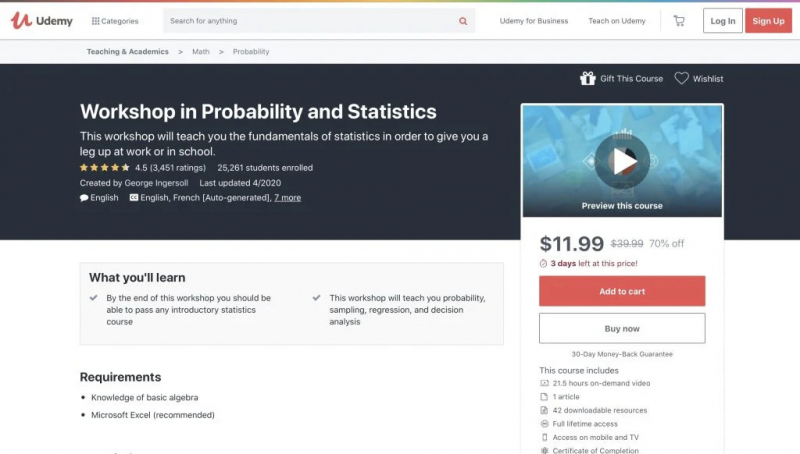
helptostudy.com 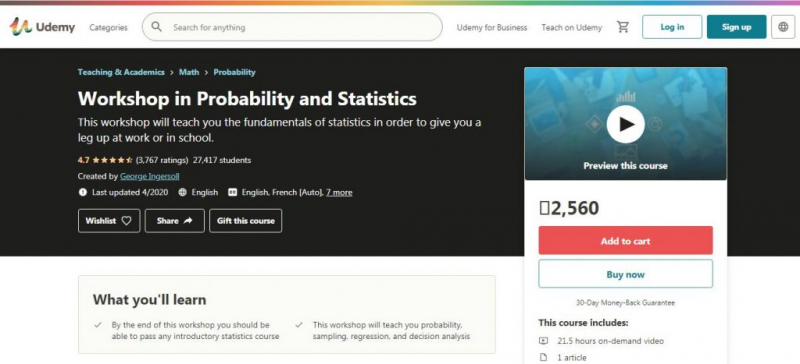
helptostudy.com















